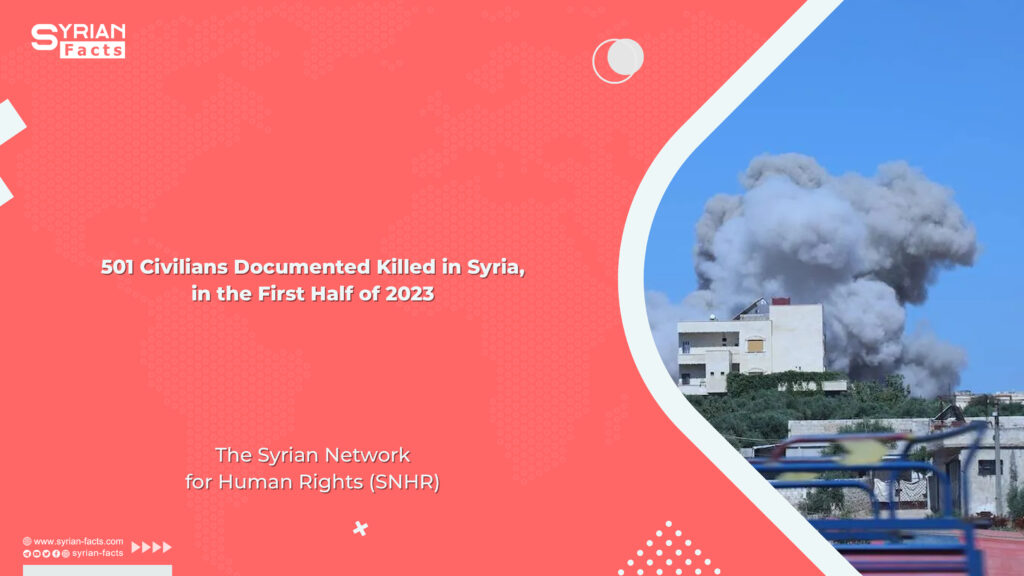The Hague – The Syrian Network for Human Rights (SNHR) revealed in its latest monthly report, released today, that 501 civilians were extrajudicially killed in Syria. Of those, the report notes, 118 civilians; including 15 children, 19 women, and four victims who died due to torture, were killed in the month of June 2023.
The 29-page report notes that extrajudicial killing crimes become so widespread primarily due to the systematic killing of civilians by Syrian regime forces and their affiliated militias. The report also stresses that the emergence of several other parties during the Syrian conflict has further increased both the importance and complexity of documenting the victims killed in Syria. To that end, the report reveals that, since 2011, SNHR has been developing complex programs to archive and categorize the victims’ data, which the team collects and verifies, enabling us to catalogue the victims according to their gender, age, the date and place of death, the governorate of origin, and perpetrator party, and to make comparisons between these parties. We can also distribute the death toll according to the governorate in which the incident of death occurred, and according to the governorate from which the victim originated, in order to show the extent of the loss suffered by the people of any governorate, enabling us to accurately ascertain the highest rates of violence documented in the case of each violation. The report categorizes the victims according to the governorate where they were killed, rather than their governorate of origin.
The report provides details on the death toll of victims documented as having been killed by the parties to the conflict and the controlling forces in Syria in the first half of 2023, up to and including June, particularly focusing on children victims, women victims, and victims who died due to torture.
The death figures included in this report on the victims killed by the controlling forces which occurred as a violation of either international human rights law or international humanitarian law or both, but does not include cases of natural deaths or those which occurred because of disputes between members of society or other such issues.
The report draws upon the information gathered from our constant daily monitoring of news and developments, through SNHR’s extensive network of relations with various sources, in addition to our analysis of a large number of photographs and videos. As the report further reveals, the continued killing incidents, including in June, across all of Syria and in various forms underlines the fact that Syria is still one of, if not the most dangerous nation in the world in terms of civilian losses through extrajudicial killings, including killing due to torture.
The Syrian regime has failed to register hundreds of thousands of citizens it killed since March 2011 in the death records of the civil registry
The report reveals that the Syrian regime has failed to register the deaths of any of the hundreds of thousands of citizens it killed since March 2011 in the civil registry’s death records, adding that the regime exerts absolute control over the issuing of death certificates, which are not made available to any of the families of its victims, including the missing and forcibly disappeared, whether these victims were killed at the hands of the Syrian regime or by other affiliated parties. The Syrian regime only allows death certificates to be issued for those who meet the narrow criteria set by the regime and its security services. The report further notes that the vast majority of victims’ families are unable to obtain death certificates from the regime, for fear of linking their names to those of individuals detained by the regime and killed under torture, since this means that these family members were dissidents who opposed the regime, or of their loved one being registered as ‘terrorists’ if they are wanted by the regime’s security services; additionally, many victims’ families have been forcibly displaced outside the areas controlled by the regime.
The report further reveals that on August 10, 2022, the regime government’s Minister of Justice issued Circular No. 22 specifying the procedures for the conduct of proceedings related to registering deaths within Sharia courts. The circular included new conditions stipulating that five items of evidence must be submitted to and approved by the relevant judges in proceedings related to registration of deaths. It also requires that all relevant courts involved in death registration cases comply with the circular’s content. The circular also imposed security clearance conditions on judicial authorities to register death cases, increasing the security services’ intrusion into these legal procedures.
Civilian death toll in the first half of 2023
The report records the killing of 501 civilians, including 71 children and 42 women (adult female) at the hands of the parties to the conflict and controlling forces in Syria in the first half of 2023. Of those, the Syrian regime killed 62 civilians, including five children and four women, while Russian forces killed five civilians. In addition, ISIS killed one civilian in the first half of 2023, whereas Hay’at Tahrir al-Sham (HTS) killed seven civilians, including two women. Furthermore, the report records that nine civilians, including one child and one woman were killed by all armed opposition factions/Syrian National Army (SNA), while 20 civilians, including five children and two women, were killed by the Kurdish-led Syrian Democratic Forces (SDF), and three civilians were killed by international coalition forces. Lastly, 394 civilians, including 60 children and 33 women, were killed by other parties.
As the report reveals, Daraa governorate saw the highest death toll of victims documented killed in the first half of 2023, accounting for approximately 25 percent of the total death toll, followed by Deir Ez-Zour governorate with approximately 22 percent, then the governorates of Aleppo and Hama with approximately 12 percent each. Most of the victims were killed by other parties.
Civilian death toll in June 2023
The report documents the killing of 118 civilians, including 15 children and 19 women (adult female) at the hands of the parties to the conflict and controlling forces in Syria in the month of June 2023. Of this total, the Syrian regime was responsible for the killing of eight civilians, including one child and one woman, while Russian forces killed five civilians. Moreover, all armed opposition factions/SNA killed one civilian, whereas HTS killed four civilians, including two women, and international coalition forces killed one civilian. Finally, the report records that 99 civilians, including 14 children and 16 women, were killed by other parties.
Victims who died due to torture and deaths among medical personnel, media workers, and the Civil Defense
As the report reveals, three medical personnel, including one woman, were killed in the first half of 2023 at the hands of Syrian regime forces, while one media worker and one Civil Defense personnel were killed by other parties in the same period. Moreover, a total of 20 individuals, including one child and one woman, died due to torture in the first half of 2023. Of those, six were killed at the hands of Syrian regime forces, while four, including one woman, were killed at the hands of HTS, two were killed by all armed opposition factions/SNA, five were killed at the hands of SDF, including one child, and finally three were killed at the hands of other parties. The report adds that four individuals, including one woman, died due to torture in the month of June.
Furthermore, the first half of 2023 saw 12 massacres. The report describes an incident as a massacre to refer to an incident in which no fewer than five peaceful individuals were killed. According to this definition, Syrian regime forces were responsible for one massacre of the 12 recorded in the first half of 2023.
The report calls on the UN Security Council to take additional steps following its adoption of Resolution 2254 and stresses the importance of referring the Syrian case to the International Criminal Court, adding that all those involved in perpetrating crimes against humanity and war crimes should be held accountable.
The report also requests that all relevant United Nations agencies make greater efforts to provide food, medical, and humanitarian assistance in areas where fighting has ceased, and in internally displaced persons’ camps, and to follow up with those states that have pledged voluntary contributions.
The report additionally calls for the implementation of the ‘Responsibility to Protect’ doctrine (R2P) after all political channels have proved fruitless throughout all the agreements reached, as well as the Cessation of Hostilities statements, and Astana agreements that followed, stressing the need to resort to Chapter VII, and to implement the norm of the ‘Responsibility to Protect’ doctrine, which was established by the United Nations General Assembly.
The report further recommends that the international community should work to launch projects to create maps revealing the locations of landmines and cluster munitions in all Syrian governorates. This would facilitate the process of clearing these lethal munitions and educating the population about their locations.
The report additionally calls on the Independent International Commission of Inquiry (COI) to launch investigations into the cases included in this report and previous reports and confirms the SNHR’s willingness to cooperate and to provide further evidence and data in any such investigations, as well as calling on the commission to focus on the issue of landmines and cluster munitions in its next report.
The report also stresses that the Syrian regime must stop the indiscriminate shelling and targeting of residential areas, hospitals, schools, and markets, as well as ending its acts of torture that have caused the deaths of thousands of Syrian citizens in detention centers and comply with UN Security Council resolutions and customary humanitarian law.
Lastly, the report reiterates its call on all the parties to the conflict to provide detailed maps of the locations where they have planted landmines, especially those present in civilian locations or areas near residential communities, as well as making several additional recommendations.





Be the first to write a comment.